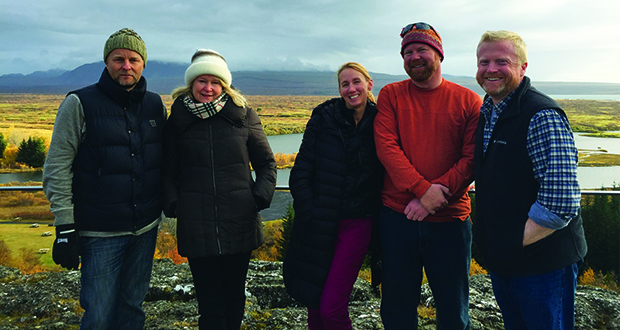
From left: Larus Isfeld of Eimskip USA; Elizabeth M. Myers of Verrill Dana; Sara Vanderwood of Maine Street Solutions; Jonathan Nass of the Maine Department of Transportation; and Benjamin E. Ford of Verrill Dana
What impact could an international conference in Iceland have for the legal community in Boston? More than you might think, according to Elizabeth M. Myers, a partner in Verrill Dana’s Boston office.
Myers attended the Arctic Circle Assembly 2015 recently to hear about how the convergence of political, commercial, legal, economic, geological and environmental issues will impact countries not only in the Arctic Circle but worldwide.
Representatives from countries across the globe joined the record-breaking 1,900 delegates at this year’s conference in Reykjavik, while the hashtag ArcticCircle2015 was a cornucopia of hot topics.
“The topics ranged from security to shipping to fishing, environmental changes, mineral rights, the sustainability of the oceans,” says Myers, a corporate lawyer.
Perhaps most immediately relevant to Massachusetts companies and law firms was the impact of environmental changes to the North Atlantic shipping lanes.
“Previously, these shipping lanes were closed for portions of the year,” Myers says. “Ice formations would block ships coming through, requiring ice breakers to pave the way.”
If the North Atlantic shipping lanes open up, it could reduce the shipping time to the U.S. by nine to 14 days.
“The opening up of these lanes would create demands and opportunities that we are uniquely positioned here in Massachusetts, and particularly Boston, to work with,” Myers says. “On the commercial side, trade and shipping companies getting into that space will need to understand U.S. permitting, U.S. shipping, maritime law. I think there is quite a bit of synergistic energy there.”
Movement has already been seen stateside to address the shipping route developments. Icelandic steamship line Eimskip recently moved its U.S. port of call from Norfolk, Virginia, to Portland, Maine, in anticipation of further developments in shipping lanes.
“If these ships are coming in over the North Atlantic lanes, they will travel by Boston on the way to New York and New Jersey,” Myers says.
Massachusetts is also well suited to take part in the developments in marine biotechnology, marine pharmaceuticals and marine research that were discussed at the conference. Myers and her colleagues sat in on presentations that looked at products and innovations where Arctic Circle countries could find common ground and collaborative opportunities with U.S. companies in those areas. Whole Foods, for example, is developing cold-pressed arctic fish oil for human consumption. Other companies are exploring pain and wound treatment options using fish-based products.
“All of which potentially links back to Boston pharmaceutical research and development companies,” Myers says.
With a burgeoning interest in fish oil and fish products, specifically fish skin used in wound treatment and fish oil for cancer treatment, Myers says, it’s no surprise that many pharmaceutical companies are looking for partnerships with Icelandic companies.
“There is an acceleration of joint research collaborations between the U.S. and Iceland, in particular on marine pharmacology,” she notes.
Meanwhile, the range of representation at the conference by countries across the globe appears indicative of just how urgent dealing with changes to the Arctic Circle has become.
“It’s not something we can just turn a blind eye to, and it’s something that is going to require the very best the world has to offer,” Myers says. “It affects everything. Look at cod. There is a move to use every part of the fish because those resources are drying up.”
Discussion also turned to the cultural impact of changes to the Arctic Circle, particularly on the indigenous Inuits of Greenland, Iceland and Alaska.
“It’s no surprise that all the world leaders of countries impacted by the Arctic were represented in some way. The information we’re receiving would indicate that climate change is happening at a much faster rate than anyone thought. All of this information drives collaborative efforts and the sharing of best practices for arctic control,” Myers says.
Joining Myers at the conference were Verrill Dana’s Benjamin E. Ford, a maritime attorney; Riikka E. Morrill, a health care and life sciences lawyer; and Sara Vanderwood, a governmental affairs consultant.
 New England Biz Law Update
New England Biz Law Update
